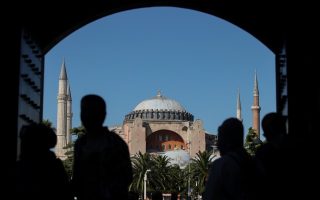Remembering forced migrations: The 1964 expulsion of Greeks from Istanbul

Eleni was shocked to see the first page of the newspaper that morning, exactly 57 years ago today: “Some of the rights of the Greeks in Turkey have been canceled.”[1] She looked around and only saw concerned faces. Tatavla, the then almost exclusively Rum Polites neighborhood, was shaking with the possibility of their worst fears coming true: being forced to leave Istanbul, their City.
It was on March 16, 1964, that the Turkish Parliament passed a decree leading to one of the largest and most traumatic episodes of forced migration in its recent history. This had been a long time coming: The course of anti-minority policies, aka Turkification, was intensified as it turned against the Rum Polites in the context (or pretext) of the civil strife in Cyprus.[2] With a decision to annul a 1930 treaty unilaterally, Turkey paved the way to an accelerated expulsion of some 12,500 Greeks within a few months – a number that would quadruple over the next two years.
Most of the expelled held Greek citizenship, yet they were all natives to the City as members of the Rum Polites community: The Greek Orthodox (Rum) of Istanbul (Polites) were among the oldest residents of this ancient city, who saw their residence permits being canceled by the most recent authority governing their hometown. They were ordered to leave the country within two weeks, taking with them only a suitcase weighing not more than 20 kilograms, and cash worth not more than 22 dollars. As all Greek citizens were deported, this meant that their family members of Turkish citizenship also had to follow. With the additional measures of freezing their assets and blocking their business transactions, the Turkish state made sure to increase dramatically the demographic erosion of this previously vibrant urban community.[3]
“It was as if we were tourists, who were going back home after a brief visit,” remembers Eleni, who was a young woman at the time. “But we were here longer than anyone else. We were not migrants or visitors, but natives for millennia! Who were they to ban us from our own Poli?”
Before the Great War, the Rum Polites comprised a quarter of the population and dominated many realms of commerce, art and cultural production in the Ottoman capital. This helped the residents of Istanbul, along with Imbros and Tenedos, to be held exempt from the forced Population Exchange in 1923 and their status to be confirmed with an agreement between Turkish President Mustafa Kemal Ataturk and Greek Prime Minister Eleftherios Venizelos in 1930. In the 1960s, despite tragedies like the Wealth Tax[4] or September pogroms[5] in the previous decades, there were still around 90,000 Rum Polites among less than 2 million inhabitants. They made up over half of the 36,000 members of the Istanbul Chamber of Commerce, around 1,000 of whom held Greek citizenship. By the end of the decade, the Rum Polites counted around 18,000. In today’s Istanbul, a megacity of some 20 million, they number merely 3,000. And the biggest blame for this loss goes to 1964 expulsions.[6]
1964 was a landmark event that greatly contributed to the decline in the cosmopolitan character of Istanbul. Despite widespread campaigns of “Citizen, speak Turkish!” that harassed those whose mother tongues were different, older generations were largely exposed to a multilingual milieu in many parts of the city. Contemporary Istanbulites hardly ever hear – and in many cases wouldn’t even be able to identify – Ladino, Armenian or Greek, all of which were part of urban daily life as well as educational, literary and artistic production for many centuries. Long-standing quality minority schools are struggling to preserve this pluralism despite their diminishing student body.[7]
Cosmopolitanism in Istanbul is further threatened by the current revival of a conquest ideology that saw the conversion of the Hagia Sophia and Chora museums into mosques last year, which represents another blow for the dwindling community of Rum Polites.[8] While some may interpret this as the final attempt for their heritage to be erased from the City’s history, Rum Polites know this is impossible. Their imprint has been too significant for too long, and their presence so fundamental and essential, such that Istanbul cannot remain the Ecumenical City without the Rum Polites.
And even if one forces Rum Polites out of Istanbul, one cannot take Istanbul out of Rum Polites. With an ever-lasting devotion to their home city, those expelled in 1964 form a global diaspora centered in Athens[9] as they continue to work with the remaining community in Istanbul[10] to improve the conditions of the Rum Polites in the City. Their activities bring hope to those who dream of better Greek-Turkish relations, of cosmopolitan coexistence in the Mediterranean, and of an end to forced migrations in the world, at a time when it is needed more than ever amid escalations in all these three realms. May this day mark an occasion to reflect on their critical importance.
Ilay Romain Ors is an associate professor in social anthropology, a research affiliate at the University of Oxford, and an instructor at Deree – The American College of Greece. She is the author of “Diaspora of the City: Stories of Cosmopolitanism from Istanbul and Athens” (Palgrave, 2018) and the editor of the volume titled “Istanbullu Rumlar ve 1964 Surgunleri” [Rum Polites and 1964 Expulsions] (Iletisim, 2019).
[1] Cumhuriyet, 17 March 1964. https://www.cumhuriyetarsivi.com/monitor/index.xhtml
[2] https://www.nytimes.com/1964/08/09/archives/turks-expelling-istanbul-greeks-communitys-plight-worsens-during.html?
[3] Ilay Romain Ors. 2018. Istanbullu Rumlar ve 1964 Surgunleri: Turk toplumunun homojenlesmesinde bir donum noktasi [Rum Polites and 1964 Expulsions: a turning point in the homogenization of Turkish society]. Istanbul: Iletisim.
[4] https://www.academia.edu/5557203/_In_GREEK_O_Foros_Periousias_os_Anti_Mionotiki_Politiki_1942_43
[5] https://www.kathimerini.gr/society/561068407/to-fanari-sta-septemvriana-toy-1955/
[6] http://www.conpolis.eu/uploadedNews/16%20Mart%201964-Eng.pdf
[7] Ilay Romain Ors. 2018. Diaspora of the City: stories of cosmopolitanism from Istanbul and Athens. Palgrave.
[8] https://theconversation.com/former-byzantine-churches-are-being-converted-to-mosques-this-threatens-istanbuls-cosmopolitan-identity-145419





